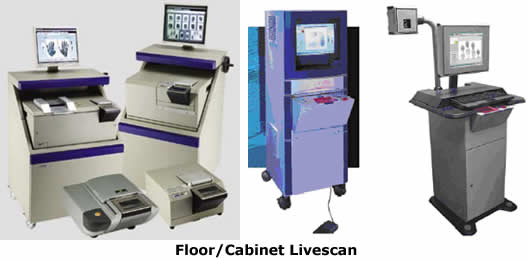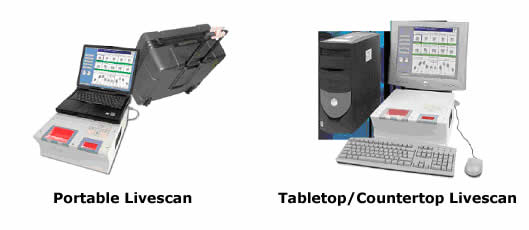Network Livescan System
What Is Network Livescan? The Network Livescan system (NLS) is the use of Livescan devices to transmit demographic data, fingerprint images and mugshots from remote locations to the State Fingerprint Data Router (FDR) for rapid positive identification of criminal and non-criminal subjects on the Identification Processing System (IPS) and Maryland Automated Fingerprint Identification System (MAFIS) for the purpose of creating a complete Report of Arrest and Prosecution (RAP) sheet. Network Livescan will allow criminal justice agencies including Juvenile, Correctional, and Parole and Probation agencies, as well as applicant processing centers, to electronically submit fingerprints for rapid identification by the State and the Federal Bureau of Investigation (FBI), thereby improving public safety. It also provides the capability to use either a Livescan capture device or a Cardscan device to enter demographic data associated with the fingerprint image and electronically transmit both data and images for identification processing.
| ||||||||||||||||
 
|
||||||||||||||||
Background The initial sets of Livescans in Maryland were implemented for the Arrest Booking System (ABS). The State law enforcement agencies participating in the State's ABS use Livescans for electronic submission of fingerprint records. ABS was installed in Baltimore City and 8 counties (Harford, Frederick, Montgomery, Howard, St. Mary's, Prince George's, Wicomico, and Charles). ABS was not deployed to the remainder of the State due to technical and architectural shortcomings of the system. Non-ABS criminal justice agencies, juvenile justice agencies and civil applicant operations must mail fingerprint cards to Maryland's Criminal Justice Information System (CJIS) Central Repository for fingerprint identification processing. The mailing of fingerprint cards does not provide timely identification, and in the case of criminal cards, serves only to update criminal history. Network Livescan will allow non-ABS criminal justice agencies including Juvenile, Correctional, and Parole and Probation agencies as well as applicant processing centers to electronically submit fingerprints for rapid identification by the State and the FBI. Benefits The benefits include:
| ||||||||||||||||
Livescan Interface Network Livescan uses industry-standard IP protocol and ANSI/NIST file format for data transmission. It transmits data using TCP/IP, SMTP/MIME format, EFTS NIST format and content, WSQ Image Compression, and ANSI/NIST file format. Network Livescan interfaces with MAFIS through the FDR. The Livescan captures the demographic data, the fingerprint images, and transmits the package together with mugshot photo taken from the mugshot system, if available, to the FDR. The MAFIS system interfaces with the Computerized Criminal History Records System (CCH) through MQ Series. MAFIS interfaces with ABS, Regional Printrak AFIS System (RAFIS), Livescan or Cardscan Entry Workstations, and FBI Integrated Automated Fingerprint Identification System (IAFIS) through TCP/IP and either SMTP E-mail protocol for encapsulation, or some form of Sockets packaging (e.g., GSP to/from XL AFIS machine) | ||||||||||||||||
Data Standards The Maryland and FBI data transmission standards have made is possible to exchange fingerprint identification data effectively between MAFIS and various jurisdictional law enforcement agencies using Livescan systems made by different manufacturers. Therefore, Livescan devices are required to meet the Maryland and FBI's IAFIS data transmission standards. These standards include the following the American National Standard Institute (ANSI) Standard, Data Format for the Interchange of Fingerprint Information (ANSI/NIST-CSL 1-1993) which defines the data format for the interchange of fingerprints, facial and scar marks, tattoos and any other data that may be used in the fingerprint identification of a subject. Such information is intended for use in the interchange between criminal justice administrations or organizations that use an Automated Fingerprint Identification System (AFIS), and will provide a common interface for AFIS and related systems nationwide. Livescan Technical Interface Document and tables The technical interface document and tables were created to provide the detail Application Program Interface (API) for various vendors approved to sell Livescan and Cardscan workstations for transmission of fingerprint images and demographic data to the State Fingerprint Data Router (FDR). Any Livescan or Cardscan that does not meet the application design, configuration or data requirement is not acceptable for record transmission to the State Fingerprint Identification System. The State reserves the right to deny records transmission from non-approved Livescan and Cardscan systems when it is in the best interest of the State to do so and without notice to the vendor or contractor. Livescan Acquisition The Department of Public Safety and Correctional Services (DPSCS) awarded contract DPSCS IT&CD 2004-05 for the purchase of Livescan equipment including installation and training and related maintenance to the following four vendors:
The above vendors' Livescan systems are on the list of products that are FBI certified in accordance with the FBI Electronic Fingerprint Transmission Specification (EFTS) CJIS-RS-0010 (V7) Version 7 dated January 29, 1999 and the Image Quality Specification (IQS) appendix F of that document. For certified Fingerprint Identification product, please visit http://www.fbi.gov/hq/cjisd/iafis/cert.htm. Maryland agencies that wish to purchase a Livescan system to transmit records to the state system can make such purchase from either the FBI approved vendors (www.fbi.gov/hq/cjisd/iafis/cert.htm) or the above listed DPSCS awarded vendors. If an agency wants to purchase a Livescan from the DPSCS vendor list, the agency should contact the DPSCS Information Technology and Communications Division (ITCD) Procurement Office at (410) 585-3116. It is the responsibility of an Agency that wants to transmit electronic records to the State through a certified Livescan device to:
| ||||||||||||||||
|
Software Certification Any agency or entity submitting identification requests to the state of Maryland electronically via a Network Livescan device must do so using software certified by ITCD. A list of vendors with current certifications is available on the Maryland Network Livescan web site. To obtain a Maryland State Certification, vendors must provide ITCD with a fully functioning, version controlled software package and sufficient hardware to adequately test the software. The software will go through an elaborate evaluation process, in an environment sufficiently like the intended production environment to assure its proper functionality. The software must be in full compliance with all Technical Interface Documents relevant to the intended application. These Technical Interface Documents are available on the Maryland Network Livescan web site. The Vendor and the ITCD NLS team will be responsible for the testing efforts, training and production support upon successful completion of the certification process. Once tested and certified to be in compliance, neither the vendor nor the user will modify the software in such a manner as to violate provisions of the Technical Interface Documents. | ||||||||||||||||
|
Requirements Changes When changes such as enhancements occur in the State's requirements, vendors with certified software will be notified and will be given a reasonable time period to bring their software into compliance. Vendors will submit a fully functioning and version controlled software package to ITCD for testing. The new version will not be released to users until it has been certified. When a vendor initiates a software change that affects or may affect compliance with the State's requirements, the software must be submitted to ITCD for evaluation. If the changes are in compliance with the State's requirements or the State determines that the requirements can be modified to allow the change, the new version will be certified. The new version will not be released to users until it has been certified. Areas not covered by a Technical Interface Document such as interfaces with other systems, local customizations and user-interface preferences do not require certification. Also, changes to areas not covered by a Technical Interface Document are allowed without renewal of the certification as long as all provisions of the State's requirements remain in compliance. The State's requirements include the mandatory use of a number of code lists that are updated from time to time. Some of the code lists are included in the Technical Interface Documents and others are available from the Maryland Network Livescan web site. The software must be designed so that code lists may be replaced without requiring retesting. Failure to maintain the current approved code lists may result in the State's refusal of electronic submissions until the code tables are properly updated. | ||||||||||||||||
Connectivity Options The three methods a Livescan equipment can be connected to the State LAN or WAN are through:
When an access is needed to connect Livescan to the State LAN or WAN, the agency will notify their Department Point-of-Contract to make those arrangements with DPSCS Point-of-Contract. | ||||||||||||||||
Production Support
| ||||||||||||||||
|
Contacts For Information concerning the Livescan Technical Interface Document and tables, please contact Edwin A. Okoye at (410) 585-3144 For Criminal, Applicant or any other record processing, Please contact the Criminal Justice Information System Unit at (410) 764-4501 or 1-888-795-0011. |
